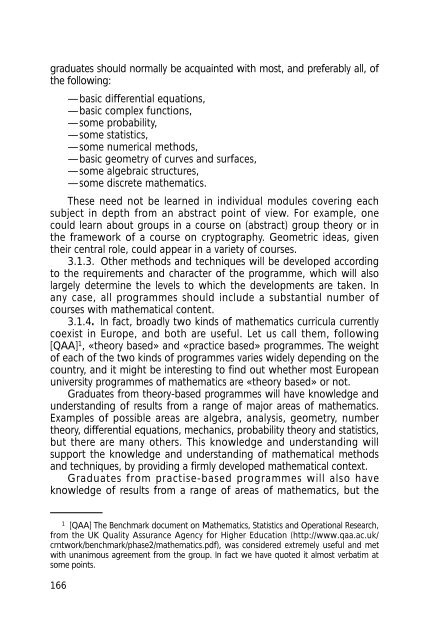Final Report Pilot Project - Relaciones Internacionales de la ...
Final Report Pilot Project - Relaciones Internacionales de la ...
Final Report Pilot Project - Relaciones Internacionales de la ...
You also want an ePaper? Increase the reach of your titles
YUMPU automatically turns print PDFs into web optimized ePapers that Google loves.
graduates should normally be acquainted with most, and preferably all, of<br />
the following:<br />
—basic differential equations,<br />
—basic complex functions,<br />
—some probability,<br />
—some statistics,<br />
—some numerical methods,<br />
—basic geometry of curves and surfaces,<br />
—some algebraic structures,<br />
—some discrete mathematics.<br />
These need not be learned in individual modules covering each<br />
subject in <strong>de</strong>pth from an abstract point of view. For example, one<br />
could learn about groups in a course on (abstract) group theory or in<br />
the framework of a course on cryptography. Geometric i<strong>de</strong>as, given<br />
their central role, could appear in a variety of courses.<br />
3.1.3. Other methods and techniques will be <strong>de</strong>veloped according<br />
to the requirements and character of the programme, which will also<br />
<strong>la</strong>rgely <strong>de</strong>termine the levels to which the <strong>de</strong>velopments are taken. In<br />
any case, all programmes should inclu<strong>de</strong> a substantial number of<br />
courses with mathematical content.<br />
3.1.4. In fact, broadly two kinds of mathematics curricu<strong>la</strong> currently<br />
coexist in Europe, and both are useful. Let us call them, following<br />
[QAA] 1 , «theory based» and «practice based» programmes. The weight<br />
of each of the two kinds of programmes varies wi<strong>de</strong>ly <strong>de</strong>pending on the<br />
country, and it might be interesting to find out whether most European<br />
university programmes of mathematics are «theory based» or not.<br />
Graduates from theory-based programmes will have knowledge and<br />
un<strong>de</strong>rstanding of results from a range of major areas of mathematics.<br />
Examples of possible areas are algebra, analysis, geometry, number<br />
theory, differential equations, mechanics, probability theory and statistics,<br />
but there are many others. This knowledge and un<strong>de</strong>rstanding will<br />
support the knowledge and un<strong>de</strong>rstanding of mathematical methods<br />
and techniques, by providing a firmly <strong>de</strong>veloped mathematical context.<br />
Graduates from practise-based programmes will also have<br />
knowledge of results from a range of areas of mathematics, but the<br />
1 [QAA] The Benchmark document on Mathematics, Statistics and Operational Research,<br />
from the UK Quality Assurance Agency for Higher Education (http://www.qaa.ac.uk/<br />
crntwork/benchmark/phase2/mathematics.pdf), was consi<strong>de</strong>red extremely useful and met<br />
with unanimous agreement from the group. In fact we have quoted it almost verbatim at<br />
some points.<br />
166


